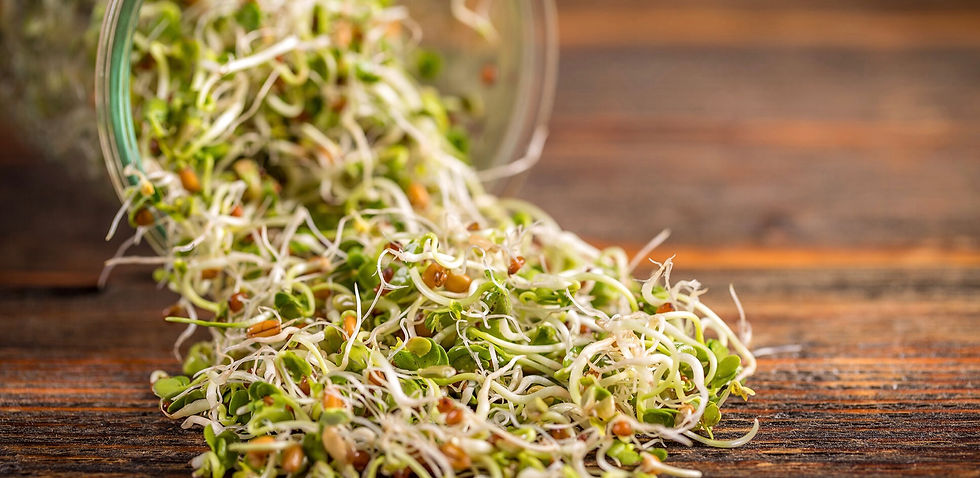...BUT WHERE DO YOU GET YOUR PROTEIN FROM?
- Ally van de Pol
- Dec 8, 2020
- 3 min read
I’ve been asked this question so many times since I started excluding animal products from my diet, and I have to say it was one of my initial concerns about going plant based. I, like so many other people, have been brainwashed over the years about smashing in the protein (read animal protein) from other trainers, experts, governments and the media. Truth be told, I was never much of a carnivore anyway and it didn’t really feel right to be filling my face with meat all the time.
I’m not sure where the myth comes from, maybe the meat and farming industry who wants us to buy and eat their wares, however the truth is there is protein in EVERYTHING and we are only likely to be deficient in protein, if we are deficient in calories. Broccoli for example (with 50% of its calories from protein) has a higher percentage of protein than pork, salmon, chicken, skimmed milk, eggs, beef and cheddar cheese per weight! You can easily meet your protein requirements on a plant based diet, for example 2000 calories of oats has 87 grams of protein and far exceeds the minimum requirement for all 8 essential amino acids.
Let’s look at human breast milk. It has 5% protein. The lowest of all mammalian milk. In fact the World Health Organisation since 1974 has recommended that we get 5% of our calories from protein (6% during pregnancy). The typical western diet contains 10-35% protein.
Also consider that this 5% figure is ideal for a baby doubling in size every few weeks. When did adults need to do this?
So what does this mean for you and how many grams of protein that ou need? If you are a woman burning 2300 calories per day, you require 29 grams of protein. It’s not even remotely difficult to achieve this; brown rice is 9% protein, potatoes are 10% protein, oatmeal is 19% protein, black beans and mushrooms are 35% protein, asparagus is 43% protein etc etc Can you see now how it’s not difficult to get adequate protein just by eating plant based foods?
The other thing to consider is that animal based diets provide excessive amounts of protein and too much of a good thing here can be harmful. Our liver and kidneys have to work harder and then their function deteriorates. The human body can compensate exceptionally well, so you might not know it’s happening, we even know that people can lead full healthy live son 50% kidney function, in fact you need to lose a considerable amount of function before it becomes noticeable.
Additionally, proteins are acidic by nature and our bodies function best when in a slightly alkaline state. Introducing too many proteins makes us too acidic. We can neutralise this acidity by eating fruits and vegetables which are alkaline, however. On a western diet consisting of too much protein and not enough fruit and veggies, our bones release calcium to neutralise the acid, over time resulting in osteoporosis. A study in 2001 published in the American Journal of Clinical nutrition found that ‘women who ate most of their protein from animal sources had three times the rate of bone loss and 3.7 times the rate of hip fractures as women who ate most of their protein from vegetable sources’.
Furthermore, animal products are very high in calories. 100 grams of beef has 282 calories, chicken 246 calories, 100 grams of brown rice 110 calories, apples 59 calories, broccoli 28 calories. They are also very high in fat; beef has 66% fat, chicken 58%, broccoli 15%, brown rice 7%, potatoes 1%.
Our stomachs respond to the volume of food we eat which affects satiety, and as whole foods have a good ratio of calories to bulk (water and fibre. Eating plant based foods is the most calorie efficient way to fill you up, not to mention the best nutrient density. And we all know what happens to excess calories…..
The saturated fat found in animal products is mainly devoid of essential fats (omega 3 and omega 6 are produced by plants). It raises our cholesterol, clogs our arteries and increases our risk for heart disease. Fish is no exception and has almost as much cholesterol as meat; compare chicken (91mg/100g food) with salmon (64 mg/ 100g food).
Given all of this…where would you like to get your protein from? A nutrient rich calorie dilute source or a calorie dense fat laden one. And that’s not even mentioning the cruel farming practices and inhumane killing that is part and parcel of the farming industry that contribute to obesity, cancer, heart disease and diabetes. Ultimately all our nutrients and proteins come from plants, so why not just cut out the middle man?





Comments